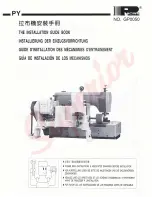
IF THE CRANK STOPS TURNING,
IT MAY BE BECAUSE...
... the operating switch is set to “Plain knitting”
... the thread is not inserted correctly. In which case
simply start again, following the instructions.
... remnants of yarn are stuck between the needle and
the shank. These can be plucked out out using the plastic
needle or a pair of tweezers.
IF STITCHES ARE DROPPED ...
... the crank was turned too fast.
... the thread was held too loosely.
... the thread was not properly caught on the needle. So
always watch the run of the yarn when knitting. In this
case, simply pick up the stitches again with the plastic
needle (as you would in normal knitting) and pull it over
the needle.
THE CRANK IS DIFFICULT TO TURN, BECAUSE ...
... the knitting yarn is set up too tightly. Remove the yarn
and thread it back again. Hold it loosely as you do so and
unwind the first few centimetres from the ball before
you knit the first row.
... the needles are damaged. Replace them following the
manufacturer’s instructions.
... the yarn has slipped over the needle heads and must
be properly repositioned.
TO CHANGE NEEDLES ...
... loosen the 4 ring holder screws with a Phillips
precision screwdriver, carefully lift the black ring holder,
hold the red insert from the inside and lift it up, unscrew
the 2 inner screws and remove the high black cylin-
der. Now gently lift out the damaged needles, replace
them with the needles supplied and put the pieces back
together in reverse order.
Troubleshooting
Gebrauchsanleitung
Instruction
Mode D’emploi
17




































